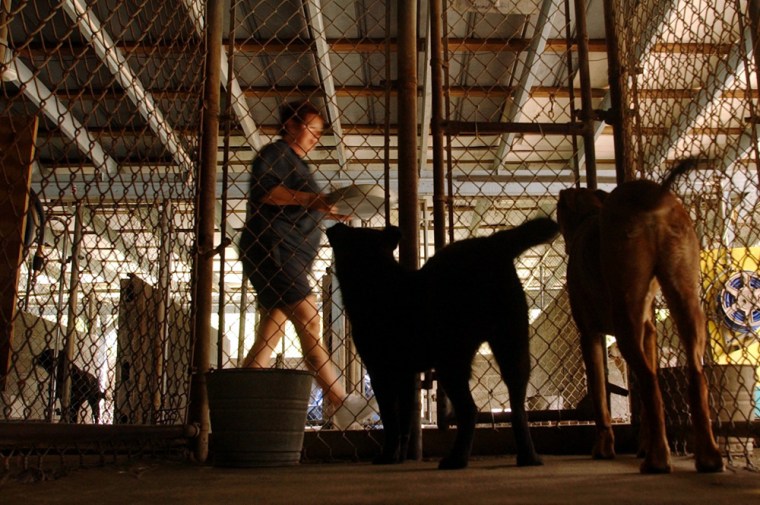The 32 dogs look up with sad eyes or wag their tails as animal control officer Linda Cordry walks the row of chain-link cages toward a door concealing a gas chamber.
“These guys are mine,” Cordry says with weary resignation. “These are basically on Death Row.”
Liberty County Animal Control and the humane shelter that shares its small cinderblock building have been crammed to capacity with dogs and cats since Army troops from neighboring Fort Stewart deployed to Iraq. Both agencies say it’s no coincidence.
The wars in Iraq and Afghanistan have prompted national efforts to alert deploying soldiers to alternatives to abandoning animals when they leave for war. But the hundreds of unwanted pets turning up in this southeast Georgia military town indicate many aren’t getting the message.
Since the Fort Stewart-based 3rd Infantry Division deployed 19,000 troops to Iraq in January, animal control officers took in 321 abandoned dogs and cats. Of those, 119 have been euthanized.
'Today's euthanasia day'
Smells of dank fur, urine and bleach linger inside the Animal Control offices, where donated food in dented cans and torn bags are stacked in a corner. Dogs are doubled up in several of the 4-by-10-feet cages. Two of the 14 cat cages hold mothers with litters of nursing kittens.
Cordry says she’s found an abundance of dogs in military neighborhoods — from emaciated dogs in back yards of vacated homes to puppies left in Dumpsters.
Many of the abandoned pets are wearing collars, but with their tags removed. Animals with collars get up to 10 days before they’re euthanized. Those without collars are spared for only three.
“We get in so many with personalities, we know they had to belong to somebody,” Cordry says. “It’s hard to say, ‘Today’s euthanasia day — let’s load them up and go for it.”’
In Hall’s case, soldiers and their families have come to the humane shelter in person to leave their dogs and cats. In some cases, single soldiers leave their pets because they have no one to keep them at home. Many animals are given up by spouses planning to stay with family while their soldiers are deployed.
Those pets won’t be put down, but Hall only has room to keep 45 animals at a time. Though Hall has found homes for 118 pets since January, the shelter remains full.
“We didn’t realize how bad it was going to be,” says Hall, whose husband is retired from the Army. “I didn’t think this many military families would just dispose of their animals because of the deployment.”
Dogs of war
Animal rescue groups say they’ve put a serious dent in wartime pet dumping, largely by using the Internet to find foster homes to care for soldiers’ animals until they return home.
Steve Albin, president of the nonprofit NetPets, says he’s found temporary homes for 8,000 military pets nationwide since starting his Military Pets Foster Program after the Sept. 11, 2001, terrorist attacks.
“Even though this is available, there’s still the 5 percent of the military, they say, ‘Nah, we’ll get another pet when we get back,”’ says Albin, a retired dog breeder in North Myrtle Beach, S.C.
In the Fort Stewart area, a small number of pet lovers have stepped up to foster dogs and cats that otherwise would have been euthanized by animal control.
Terry Wolf of nearby Savannah has taken in 85 abandoned dogs from Liberty County since January through her shelter, Southern Comfort Animal Rescue. She’s found permanent homes for about 40, and foster homes for 25.
Wolf says she’s looking for people who truly want a pet, rather than those seeking to make a patriotic gesture.
“I had one lady, she was very interested in a dog, say to me, ‘I want a soldier’s dog.’ And that made me question her commitment,” Wolf says. “We’re not putting yellow ribbons around their necks here. They’re all dogs of war to me.”
